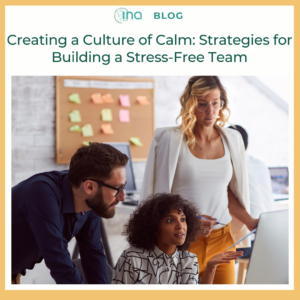 By Sophia Torres
By Sophia Torres
In today’s fast-paced work culture, stress is inevitable, and it can easily affect the dynamics of a team. Therefore, having a stress-resilient team is necessary for producing successful results. When members are calm and focused on their day, they can bounce back from setbacks, maintain priorities, and achieve their objectives efficiently. But how can businesses play a role in this?
Read this blog post to find all the strategies and tips that work.
Identify Sources of Stress
Lack of Communication
Miscommunication or a lack of communication is usually one of the main factors that create stress for employees. Employees often experience anxiety and confusion when they don’t have access to clear information or feel they are not being heard. To prevent this from happening, there are ways to implement effective communication practices, such as regular meetings, open-door policies, and clear channels for feedback and information sharing.
Overworking
A heavy workload is usually a source of stress in the workplace. When employees have too much to do or unrealistic deadlines to meet, they may feel overwhelmed. This leads to burnout, poor performance, and decreased job satisfaction. What can employers do in that case? Distribute workloads more evenly, set reasonable deadlines, and provide support and resources to help employees manage their workload.
Interpersonal Conflicts
Interpersonal conflicts in the workplace don’t happen too often. But when they do, they can arise from various sources, such as differences in personality, working styles, or values. Conflicts are never healthy, especially in the workplace, as they create tension, frustration, and stress among employees and can even escalate into more serious issues if not addressed. Employers can promote a positive work environment by encouraging open communication, providing training, and encouraging a culture of mutual respect and understanding.
Lack of Control
Employees with little control over their work usually experience stress and anxiety. This can come from micromanagement, strict work processes, or limited decision-making ability. Employers can reduce this stress by providing more autonomy and flexibility in work assignments, empowering employees sometimes to make decisions and feel important in the workplace.
Burnout
Burnout is a state of physical and emotional exhaustion caused by chronic work-related stress. This leads to decreased productivity, lower job satisfaction, and even physical condition. Employers can prevent burnout by promoting work-life balance, providing resources and support for stress management, and encouraging employees to take breaks and self-care.
Implementing a Stress-Resilient Team Culture
Communicate with Employees
Employers can communicate the importance of stress resilience to employees by highlighting the impact of stress on their health and well-being. Resources, training, and employee support are great methods to help them manage stress and build resilience over time.
Lead by Example
Leaders play a huge role in impacting employees. They can model stress-resilient behaviors and promote a workplace well-being culture. By caring for their physical and emotional health, leaders can demonstrate the importance of self-care and stress management to their team members.
Regularly Adjust Workplace Practices to Ensure Effectiveness
Employers can adjust workplace practices to promote stress-resilient team culture and make changes effectively when necessary. Employers can get employee feedback, monitor workplace metrics, and adapt policies and procedures as needed.
Monitor Employee Well-Being and Satisfaction
There are many ways to monitor employee satisfaction. This can be done, for example, by checking in with employees, offering surveys or focus groups, and tracking key metrics such as employee engagement and turnover rates. Monitoring employee well-being identifies potential sources of stress and highlights the importance of addressing them before turning them into something more serious.
Sophia Torres is a skilled Emergency Room Nurse with a passion for writing. In her free time, Sophia enjoys crafting engaging and informative articles on various topics, including healthcare and personal development. With years of experience in the medical field and a keen eye for detail, Sophia’s writing is informative and relatable. In addition, Sophia enjoys hiking and exploring the outdoors with her family when she’s not busy working in the ER or writing.
